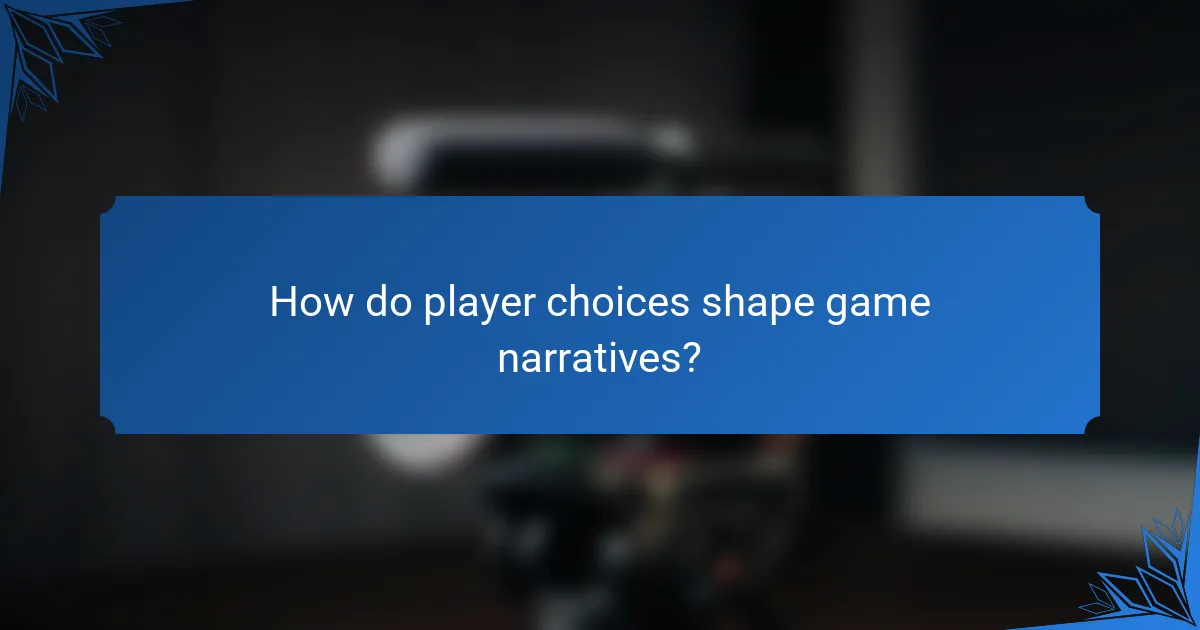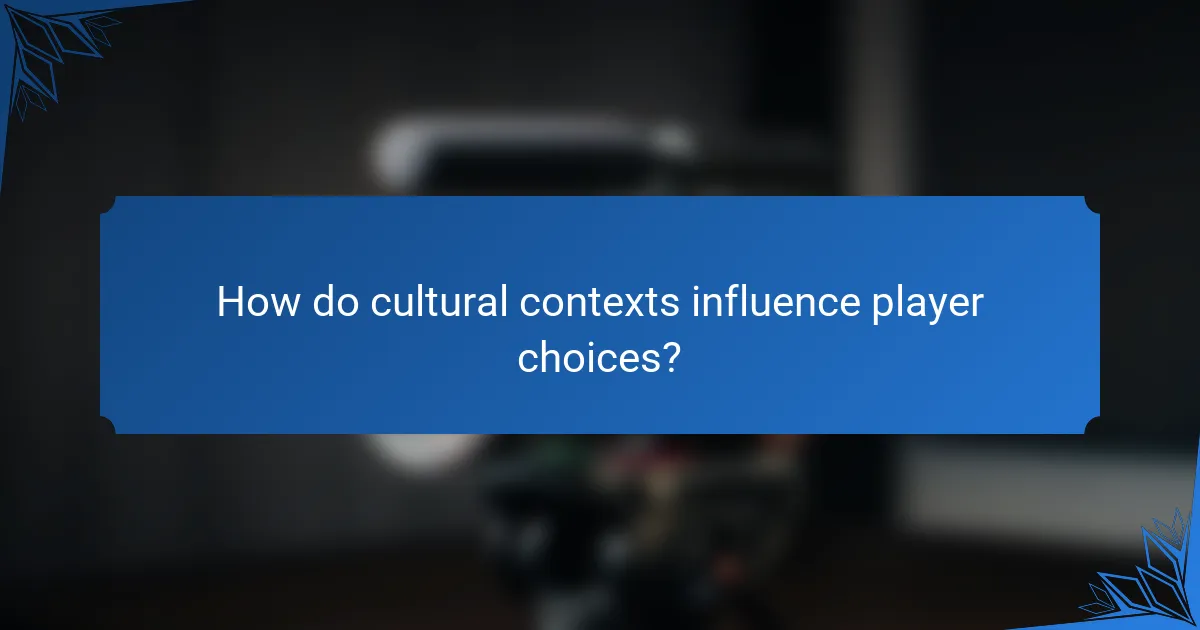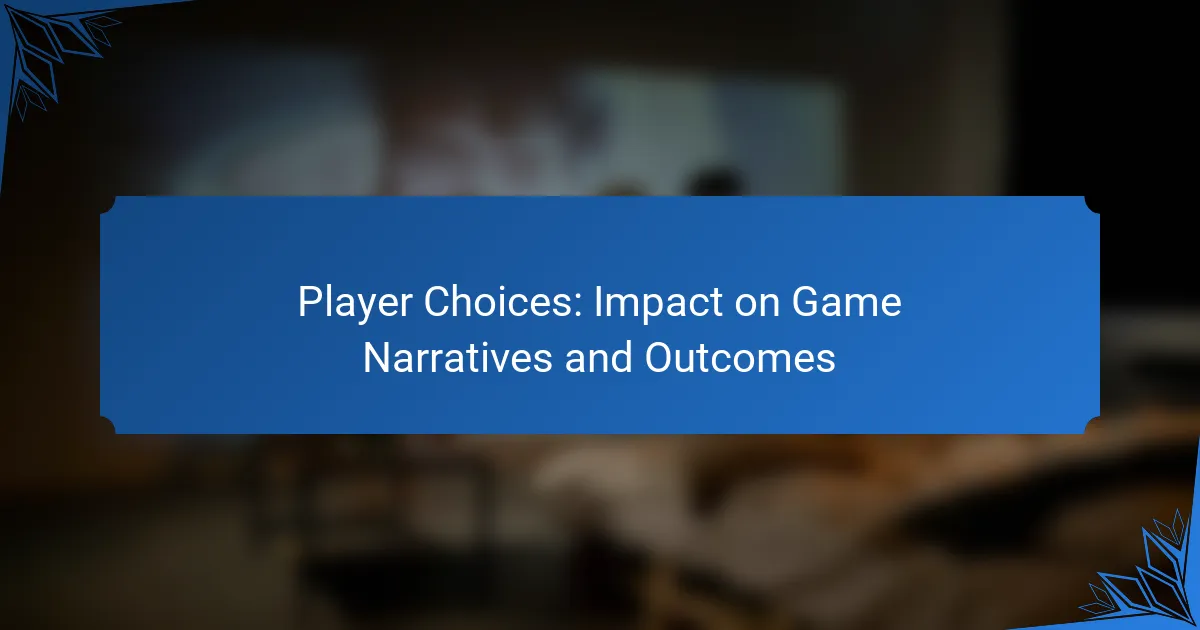Player choices play a crucial role in shaping game narratives and outcomes, influencing character development, plot twists, and the overall gaming experience. By making decisions, players create a unique and personalized journey, resulting in varied storylines and endings that enhance engagement and immersion in the game world.

How do player choices shape game narratives?
Player choices significantly influence game narratives by determining character arcs, plot developments, and overall outcomes. These decisions create a personalized experience, allowing players to engage deeply with the story and characters.
Character development
Character development is heavily influenced by player choices, as decisions can lead to different personality traits and relationships. For example, a player may choose to befriend or betray a character, which can alter that character’s growth and their interactions with others. This dynamic creates a more immersive experience, as players see the consequences of their choices reflected in character evolution.
In many games, players can also shape their character’s skills and abilities based on decisions made throughout the narrative. This customization allows for varied gameplay experiences, as players can develop unique character builds that align with their chosen path.
Story branching
Story branching occurs when player choices lead to multiple narrative paths, creating a non-linear storytelling experience. This means that a single game can have several endings, each influenced by the decisions made throughout the gameplay. For instance, choosing to save a village may lead to a heroic ending, while ignoring it could result in a darker outcome.
Games often implement branching narratives through dialogue options and key decision points. Players should be aware that some choices may have immediate effects, while others can have long-term consequences that unfold later in the game.
Player agency
Player agency refers to the degree of control players have over the game’s narrative. High player agency allows for significant influence over story direction and character fates, making the experience feel more personal and engaging. Players should seek games that offer meaningful choices, as these can enhance emotional investment in the story.
However, too many choices without adequate consequences can lead to confusion or a lack of direction. It’s essential for developers to balance player agency with a coherent narrative structure to ensure that choices feel impactful and relevant to the overall story.

What are the impacts of player choices on game outcomes?
Player choices significantly influence game outcomes by shaping narratives, altering character dynamics, and affecting gameplay mechanics. These decisions can lead to varied experiences, making each playthrough unique and personalized.
Multiple endings
Many games feature multiple endings that depend on the choices players make throughout the story. For instance, a player might save a character or let them perish, leading to drastically different conclusions. This branching narrative structure encourages players to replay the game to explore all possible outcomes.
Games like “The Witcher 3” and “Detroit: Become Human” exemplify this, offering a range of endings based on critical decisions. Players should consider the long-term effects of their choices early in the game to fully appreciate the narrative depth.
Character relationships
Player choices can significantly impact relationships with other characters, affecting dialogue options and alliances. For example, choosing to support a character in a conflict may strengthen their bond, unlocking new quests or storylines. Conversely, betrayal can lead to hostility or even character exits.
In games like “Mass Effect,” relationship dynamics are crucial for character development and story progression. Players should be mindful of their interactions, as positive or negative choices can lead to different gameplay experiences and emotional outcomes.
Gameplay mechanics
Choices made by players can also influence gameplay mechanics, such as resource management, combat strategies, and skill development. For instance, a player who opts for a stealthy approach may unlock different abilities compared to one who favors brute force. This choice can affect how challenges are approached and overcome.
In games like “Fallout” or “Skyrim,” players can tailor their gameplay experience based on decisions that align with their preferred play style. Understanding the mechanics tied to choices can enhance strategy and enjoyment, making it essential for players to think critically about their decisions.

Which games exemplify player choice impact?
Several games showcase the significant impact of player choices on narratives and outcomes. Titles like The Witcher 3: Wild Hunt, the Mass Effect series, and Detroit: Become Human highlight how decisions can lead to diverse storylines and endings, enhancing player engagement and immersion.
The Witcher 3: Wild Hunt
The Witcher 3 is renowned for its intricate storytelling and the weight of player choices. Decisions made throughout the game can drastically alter the fate of characters and entire regions, leading to multiple endings. For example, choosing to side with different factions can result in various outcomes for the game’s world and its inhabitants.
Players should consider the long-term consequences of their choices, as some actions may not reveal their impact until much later in the game. Engaging with side quests often provides deeper insights into the game’s lore and character motivations, further enriching the narrative experience.
Mass Effect series
The Mass Effect series is a prime example of how player choices shape the overarching narrative across multiple games. Decisions made in one installment carry over to subsequent titles, influencing relationships and the fate of entire species. For instance, players can choose to save or sacrifice key characters, which can lead to vastly different story arcs.
It’s crucial for players to think strategically about their choices, as certain decisions can alienate allies or create enemies. Building relationships with characters can unlock unique storylines and endings, making it beneficial to explore dialogue options thoroughly.
Detroit: Become Human
Detroit: Become Human focuses on the moral implications of player choices in a futuristic setting where androids seek freedom. Each decision can lead to a multitude of branching paths, affecting not only individual character fates but also the overall societal outcome. Players may find themselves navigating complex ethical dilemmas that challenge their values.
To fully appreciate the narrative depth, players should explore different choices in multiple playthroughs. The game encourages experimentation, as even small decisions can lead to significant shifts in the storyline and character development, making it a rich experience for those who enjoy exploring varied outcomes.

What frameworks help analyze player choices?
Frameworks for analyzing player choices focus on understanding how decisions impact game narratives and outcomes. These frameworks help developers create engaging experiences by mapping player agency to story progression and character development.
Narrative design principles
Narrative design principles guide the integration of player choices into game storytelling. Key principles include branching narratives, where decisions lead to different story paths, and character agency, which allows players to influence the game world meaningfully. Effective narrative design ensures that choices feel impactful and resonate with players, enhancing immersion.
For instance, a game might present a moral dilemma where players choose between saving a character or pursuing a mission. This choice can lead to varying consequences, such as altered relationships or different endings, emphasizing the weight of player decisions.
Player choice models
Player choice models categorize how players interact with choices in games. Common models include binary choices, where players select between two options, and multi-faceted choices, which offer several paths with varying consequences. Understanding these models helps developers predict player behavior and tailor experiences accordingly.
For example, a game might use a multi-faceted choice model to allow players to negotiate, fight, or evade a conflict, each leading to distinct narrative outcomes. This complexity can enhance replayability, as players explore different strategies and their effects on the story.

How do cultural contexts influence player choices?
Cultural contexts significantly shape player choices by affecting their values, beliefs, and expectations within a game. These influences can lead to different interpretations of narratives and varying responses to in-game decisions, ultimately impacting the overall gaming experience.
Regional storytelling traditions
Regional storytelling traditions play a crucial role in how narratives are crafted and perceived in games. For instance, cultures with rich oral histories may favor narratives that emphasize communal values and moral lessons, while others might prioritize individual heroism and personal journeys. Understanding these traditions can help developers create more relatable and immersive experiences for players from different backgrounds.
Games that incorporate local myths or folklore can resonate more deeply with players, enhancing engagement. For example, a game set in Japan might draw on Shinto beliefs, influencing character development and plot progression in ways that feel authentic to local players.
Player demographics
Player demographics, including age, gender, and cultural background, significantly affect choices and preferences in gaming. Younger players may gravitate towards fast-paced action and social interaction, while older players might prefer narrative depth and strategic gameplay. Recognizing these trends helps developers tailor experiences to meet diverse audience needs.
Moreover, gender representation in games can influence player engagement. Games that offer strong, relatable female characters may appeal more to female gamers, while those that focus on traditional male archetypes might attract a different audience. Understanding these demographic factors can guide developers in creating inclusive and appealing narratives.

What are emerging trends in player choice mechanics?
Emerging trends in player choice mechanics focus on enhancing player engagement through more dynamic and personalized experiences. These trends include adaptive storytelling, AI-driven narratives, and cross-media integration, each offering unique ways to shape game outcomes based on player decisions.
Adaptive storytelling
Adaptive storytelling allows narratives to change in response to player choices, creating a more immersive experience. Games like “The Witcher” series exemplify this, where decisions made by players can lead to vastly different story arcs and endings.
To implement adaptive storytelling effectively, developers should consider branching narratives that offer meaningful consequences. This requires careful planning to ensure that each choice feels impactful and that players are aware of the potential outcomes without overwhelming them with options.
AI-driven narratives
AI-driven narratives utilize artificial intelligence to create responsive storylines that evolve based on player interactions. This approach can lead to unique experiences for each player, as the AI adapts the plot and character behaviors in real-time.
For instance, games like “Detroit: Become Human” leverage AI to analyze player decisions and adjust the storyline accordingly. Developers should ensure that the AI’s responses are coherent and relevant to maintain immersion and avoid breaking the narrative flow.
Cross-media integration
Cross-media integration involves connecting game narratives with other media formats, such as films, books, or web series. This trend allows players to experience a cohesive story across different platforms, enhancing engagement and expanding the narrative universe.
Examples include franchises like “Halo,” which spans video games, novels, and animated series. When pursuing cross-media integration, developers should maintain consistency in character development and plotlines to ensure a seamless experience for players navigating multiple formats.



